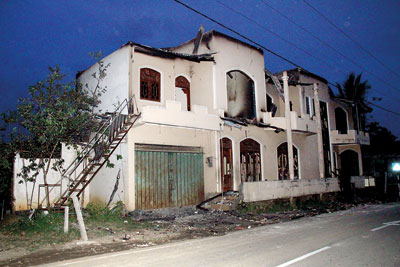News
Buildings can be rebuilt, but not broken hearts
Helpless and hopeless. These are the words used by members of the Muslim community to describe their feelings in the aftermath of this week’s wave of communal violence that swept across several areas in the Kandy District.
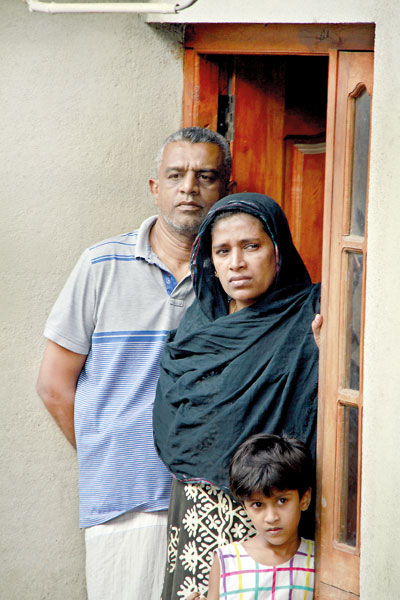
Digana: Muslim families in shock and disbelief. Pix by Indika Handuwala
The swiftness and the ease with which the attacks were carried out have left them in shock and disbelief. The damage caused to Muslim business establishments and houses has been extensive in several areas but more extensive is the damage done to inter-communal relations in a district where Sri Lanka’s all three main communities have lived side by side for centuries.
“It is my heart that is broken. It is a sense of great sadness I feel when I see the destruction around me,” said J. Amanulla, a resident of Digana. Several generations of his family have lived in peaceful cohabitation with the members of the Sinhala community in the area, but last Monday all that changed. Around 4.30 p.m. a mob rampaged through the Digana town setting fire to Muslim-owned shops in the Digana town and stoned several houses in the Kumbuk Kandura area.
Mr. Amanulla and his extended family that own five houses down the lane remained huddled inside their homes with locked doors as the mob approached.
“We saw the mob coming and hid inside our homes. Soon they began throwing big stones and bricks damaging our windows and the roofs. They also set fire to a plastic water tank in front of our house. After several terrifying minutes which felt like hours for the frightened residents, the mob withdrew,” he said. The broken glass panes and large rocks remain strewn around the house while children, too young to fathom the seriousness of their plight, play amidst the rubble.
The family members have not spent a night in their houses since their homes were attacked choosing to stay in homes of relatives where they feel safer. The question of their future is weighing heavily on Mr. Amathulla’s mind as much as it is no doubt on many of the members of the Muslim community.
“Who is going to take care of us? We don’t know what is going to happen to the Muslims of this country in the future. The Government didn’t do enough to help us,” he said.
The violence against the Muslim community flared up on Monday after the death of M.G. Kumarasinghe (41), a resident of Posgohuwa in Meda Mahanuwara on March 4. The man, a lorry diver had been assaulted by a group of Muslim youth in a three-wheeler following a road incident on February 22. A week later, he died at the Kandy Teaching Hospital due to injuries he suffered in the assault. However there is no evidence to show that the attack on Kumarasinghe was racially motivated but was an incident of road rage. (See story below)
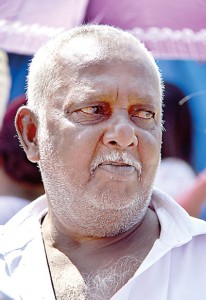
Abdul Cader
Tensions in the area had been running high since news of Kumaraisnghe’s death got around but members of the Buddhist clergy in his village as well as prominent members of the Muslim community had held a meeting to discuss ways to defuse the situation. They also discussed how the family could be assisted in the funeral arrangements with offers of a substantial amount of monetary assistance collected from members of the Muslim community.
It was while these measures were underway that the first attack on two Muslim-owned shops began in the town of Moragahamulla, located about six kilometres away from the deceased lorry driver’s village. Towards evening on Monday, a large mob gathered in the town of Digana. Armed with stones, wooden poles and petrol cans, they set fire to shops and vehicles while houses in the area were stoned. Over the next three days, the attacks continued targeting Muslim-owned businesses as well as mosques, while the violence spread to several other areas including Rangala, Katugastota, Menkihinna, Pallekele, Teldeniya, and Pujapitiya.
Many residents in these areas allege that there was little Police action despite early warnings of attacks on the Muslim community. They allege that attacks took place on two days even while a police curfew was in place, with mobs roaming around largely unchallenged torching buildings.
Abdul Cader (68), a resident of Balmulla, said that once news of the attack at Moragahamulla got around, people had alerted the Police and some politicians in the area asking for extra security but their pleas were ignored.
“We knew there was chance the violence could spread and alerted those we could but no action was taken. Now it is too late because the damage is done,” he said.
He is among a group of people who had gathered at the Balamulla West Community Service Centre where Buddhist monks, Muslim moulavis and senior police officers addressed them on Thursday. They were assured proper security measures while discussions were also held on relief measures for those affected by the violence.
At the Hajirapura Masjid in Digana, too, Muslims had organised relief to those in need of food and clothing. A. Khairullah, a member of the mosque administrative committee, acknowledges that the attack on the Sinhala lorry driver by a group of Muslim youth had triggered the violence. “We are aware of that incident. These men were drunk when they attacked an innocent man. They are not true Muslims,” he said.
Many of those gathered at the Masjid question why the entire community is being held responsible for a crime committed by a few drunken men.
“We are a peaceful people. We have not resorted to violence asking for a separate state. We make money and spend our own money. We only want to engage in our businesses in a peaceful environment and we want the right to live in peace,” said S.M. Tazleen, a resident of the area.
The heavy presence of military personnel since Wednesday and a night time curfew have prevented the outbreak of any major incidents, though sporadic incidents of stoning are being reported.
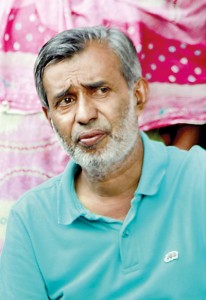
J, Amanulla: "Who is going to take care of us?"
Army Commander Lieutenant General Mahesh Senanayake who was in Kandy on Friday met members of the business community and assured that a high level of security would be maintained until the situation returned to normal.
He also said that the army would rebuild the damaged buildings.
“The President informed me that money would be disbursed from the President’s Fund for the reconstruction work,” he said.
“We can rebuild broken buildings but we can’t rebuild broken hearts. It is up to members of every community to sit together and mend fences,” the Army Commander said.
The challenge ahead for both the Government and the residents in the area will be to ensure that there is no repetition of the ugly events of the past few days.
Additional reporting from L.B.Senaratne.
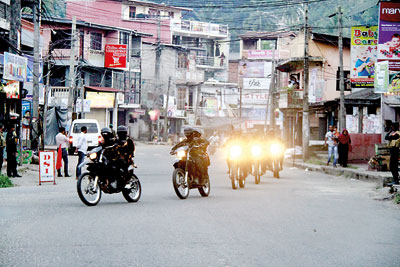
Keeping the peace: Army special forces in Madawala
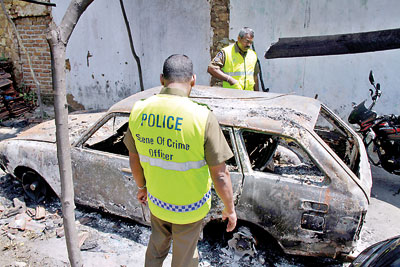
Scenes of destruction in Kengalle (above) and Ambanpitiya (below)
